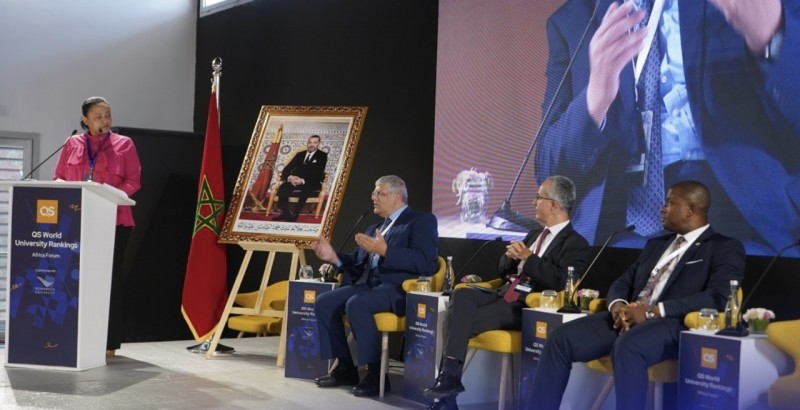Rabat - Morocco’s Mohammed VI Polytechnic University (UM6P) hosted its inaugural edition of the QS Africa Forum on Thursday and Friday. The event was organized in partnership with Quacquarelli Symonds (QS), a British firm behind one of the world’s most prestigious higher education rankings.
The forum focused on challenges facing education and higher education in Africa, as well as the continent’s potential in the field, and some of its recent achievements.
While the event’s speakers highlighted the many difficulties facing the continent in its pursuit to be more internationally recognizable, there was also an air of optimism for the future, as well as a clear vision of the steps that need to be taken to ameliorate its position.
Speaking on the challenges facing African education, Olusola Oyewole, Secretary-General of the Association of African Universities, maintained that there is an urgent need to redefine education in Africa.
For him, Africa’s current system remains fashioned after colonial legacies, using teacher-centered pedagogy that has more downsides than benefits.
Currently there are several major challenges facing African universities, most notably funding, access, and political challenges. These issues only make these effects of outdated educational methods more pronounced, leading to a need to reinvent what education is like in Africa.
Oyewole maintains that this redefinition should focus on promoting collaboration between different institutions, and building a collective African “brand” in higher education.
This African brand came up as a key point for other speakers as well, including Abiodun Humphrey Adebayo, vice chancellor of Covenant University.
He says that there is a misconception that African universities are less capable, not only among citizens of the “global north,” but also in Africa itself. Stressing that this mindset has to be changed, Adebayo highlighted that there are a lot of great achievements happening at African universities.
Amr Adly, president of Egypt Japan University of Science & Technology, echoed these statements, saying that Africa needs a sort of PR campaign. Having already had academic breakthroughs with several Africans winning Nobel prizes, the problem Africa faces for him is a lack of publicizing those achievements.
Amine Bensaid, President of Morocco’s Al Akhawayn University (AUI), also shares this sentiment, stressing that his institution tries to broadcast its image internationally while also retaining its Moroccan and African identity.
Digitization is another important aspect for Oyewole to reinvent African education. Greater integration of digital tools in education can not only increase the competitiveness of African education on the world stage, but can also improve accessibility through distance learning.
What is being done right
Despite the focus on the challenges facing education in Africa, speakers pointed out the results of the many things that are being done right on the continent.
Abiodun Adebayo said Africa is blessed with exceptional diversity in its culture and languages, representing a tremendous advantage for the continent.
Another advantage for African universities lies in the continent being home to the world’s youngest population and fastest growing middle class, providing more demand than ever for quality higher education.
African universities are already seeing a notable increase in global rankings, QS Chief Commercial Officer Jason Newman said, noting that on the continent Morocco is third behind South Africa and Egypt in gaining global recognition.
UM6P President Hicham El Habti spoke about the university’s own achievements in elevating Moroccan and African higher education. Despite its young age, the university has become one of the continent’s most notable higher education institutes and research centers.
El Habti particularly noted the university’s research facilities, with its experimental farms and mines, allowing students and researchers to conduct effective research under realistic circumstances.
The university also operates Morocco’s biggest data center as part of this vision, and plans to open more campuses and research facilities in Casablanca and Mazagan. El Habti further highlighted the university’s efforts in supporting entrepreneurship in Morocco and Africa.
Through its partnerships with institutions in Europe, America, and the rest of the world, UM6P also hopes to position itself as a center for communication between Africa and the rest of the world.
AUI’s Bensaid similarly highlighted his institutions’ accomplishments, noting more than 400 international partners that the university’s students can visit on exchange, or work with in other capacities.
Such an international approach could help improve the reputation of African universities, one of their greatest challenges as previously mentioned. Students who go abroad for further studies or employment can also bring back those skills to their home countries, several speakers pointed out.
Morocco’s higher education authorities and institutions have upped efforts lately to gain more recognition on the international stage, by partnering with international and foreign organizations.
In May 2022, eight Moroccan universities were featured on the Times Higher Education (THE) list, with Kenitra’s Ibn Tofail University ranking first among them.
Source: Morocco World News

